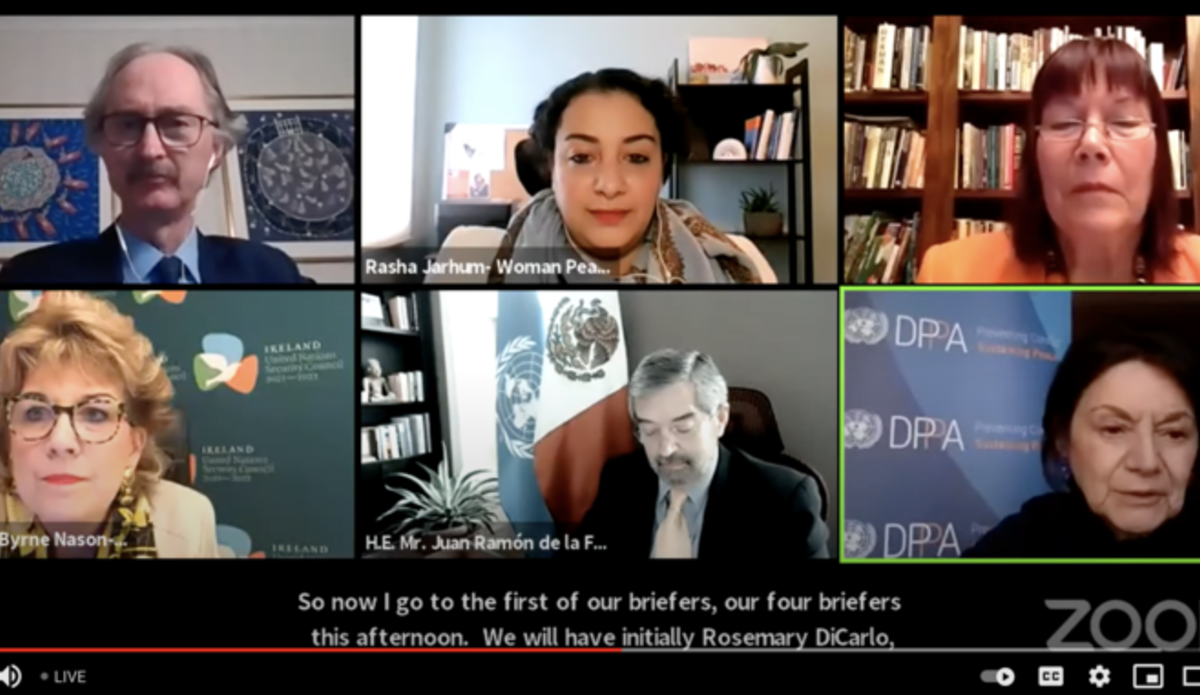USG DiCarlo Remarks at the Security Council Arria Formula Meeting “Leading by Example: Ensuring the Full, Equal and Meaningful Participation of Women in UN-led Peace Processes”
Thank you, Ambassador Nason. I am pleased to be here on International Women’s Day to discuss an issue so fundamental to women’s rights.
Let me begin by congratulating Ireland and Mexico on assuming your roles as chairs of the Security Council’s Informal Experts Group on Women, Peace and Security. Your efforts to bring attention today to the issue of women’s participation in peace processes reflect both the seriousness of the challenges we face and the urgency of action required.
Last year, as we marked the 20th anniversary of Security Council resolution 1325 (2000), the resounding message from women’s activists across the world was clear – far more remains to be done to realise the promise of the women, peace and security agenda.
As the Secretary-General recently reported, women are currently Heads of State or Government in 22 countries, and only 24.9 per cent of national parliamentarians are women. At the current rate of progress, gender equality of Heads of Government level will take another 130 years.
We are, therefore, pleased that this year’s session of the Commission on the Status of Women is devoted to increasing the participation of women in public life – and that includes participation in peace and political processes.
We know that women are essential to identifying durable and inclusive political solutions that can lead to sustainable peace. Yet overcoming the obstacles to their participation – entrenched power politics, patriarchal attitudes and unequal social structures – has no quick fixes.
Comprehensive, long-term efforts are needed from all stakeholders. The United Nations is committed to playing its part.
So you may ask, “What efforts are we making?”
First, we know that we must lead by example.
The Secretary-General is committed to achieving gender parity among UN staff. He has appointed women to serve in over 57 per cent of senior leadership posts in Special Political Missions, including the heads of mission in Afghanistan and Iraq that are the two largest missions.
We have ensured that UN-led and co-led processes consistently include women in mediation support teams. In 2020, 40 per cent of staff working in these teams were women.
And we are committed to meaningful women’s participation in peace processes led by the United Nations. We have made a progress but much more needs to be done.
Second, we are pursuing innovative participation models. In Libya, the UN has facilitated consultations with women’s groups that has led to the inclusion of more women in intra-Libyan dialogues. The UN also ensured 22 percent women’s participation in the 75-person Libyan Political Dialogue Forum meeting last November. The Forum agreed to a new political roadmap with a 30 percent quota for ministers and deputy ministers in governmental agencies. In Yemen, our envoy has held focus groups with over 500 Yemenis, over a third of them women and nearly half youth regarding potential peace negotiations.
There is no substitute for having women at the table, but we have encountered obstacles even in the processes that the UN leads.
To overcome them, we have created women’s advisory boards in Iraq, Syria and Yemen to ensure that women’s voices are taken into account. Members of the Syria advisory group are now sitting at the table in Syria’s Constitutional Committee, which includes 30 percent female membership.
We have strengthened our cooperation with regional women mediator networks. In 2020, this included supporting FemWise deployments to Cote D’Ivoire, Libya, Mali, and South Sudan.
We are also working with international mediators on practical ways to expand women’s participation in peace processes. Since 2013, more than 250 senior envoys, negotiators and experts, from all regions of the world, have participated in the UN High-Level Seminar on Gender-Inclusive Mediation Strategies.
Women’s participation also continues to be a matter of acute concern in peace processes not led by the United Nations.
The Afghanistan peace negotiations that began in September represent a significant step towards peace. Regrettably, women remain underrepresented in both negotiating teams.
The UN has supported the convening of hundreds of Afghan women, over several months, on their priorities for peace negotiations. I travelled to Afghanistan in July 2019 with the Deputy Secretary-General to hear the views of Afghan women on the future of their country.
They were determined to maintain the rights they have gained and eager to lead. They deserve our full support.
And my third and final point - we need sustained funding for our efforts. Every project funded by the UN’s Peacebuilding Fund includes dedicated funding towards women’s empowerment. Since 2018, the Peacebuilding Fund has allocated 40 per cent of its annual total investments towards gender equality initiatives, which in 2020 amounted to $69 million.
Young, marginalized and rural women face additional barriers to their political participation. This is why we have scaled up the Peacebuilding Fund’s Gender and Youth Promotion Initiative from $2.7 million in 2016 to $36.6 million in 2020. In Sudan, these funds will be used to build a diverse, intergenerational group of women leaders from remote, conflict-affected areas to meaningfully engage in peace efforts.
In all these efforts, the UN works closely with partners in pursuit of our common objective of securing women’s participation.
After all, it is clear, that more than 20 years since the adoption of resolution 1325, the hard work of influencing decision-makers, expanding community support for women’s participation, and overcoming structural obstacles, can only be done with the sustained political will, commitment and investment of us all.
Thank you.

